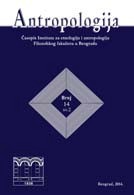"ZOVITE IH PO OČEVIMA NJIHOVIM": MUŠKA STERILNOST I NOVE REPRODUKTIVNE TEHNOLOGIJE U SVETLU ISLAMA
"NAME YOUR ADOPTED SONS AFTER THEIR FATHERS".
MALE STERILITY AND THE NEW REPRODUCTIVE TECHNOLOGIES IN THE LIGHT OF ISLAM
Author(s): Marko PiševSubject(s): Gender Studies, Customs / Folklore, Islam studies, Cultural Anthropology / Ethnology, Health and medicine and law, Family and social welfare
Published by: Институт за етнологију и антропологију
Keywords: Islam; patrilineal descent; fatherhood; male sterility;new reproductive technologies (NRT);
Summary/Abstract: Generally speaking, many patrilineal and patrilocal communities highly appreciate male fertility. In islamic societies Qur'an dogma givs strict preference to patrilinearity over matrilinearity, and ascribes primary importance to the biological fatherhood. The reader of Qur'an will, in the Surat Al-Ahzab, come across the verse "Name your adopted sons after their fathers, that is more just with Allah", while one of the experts on Arabic literature emphasizes the fact that male characters in many stories stand out through their fatherhood, especially the one expressed in relation to their sons. In such social context – shaped mainly by the absolute authority of faith – reproductive "incompetence" of an individual is reflected through specific biological "defect" which primarily stigmatizes male population. Thus, women are those who most often take over "the guilt" of infertility. Discussing some elements of islamic bioethics this paper shall focus on the issues whether and how new reproductive technologies are being used for treatment of male sterility in these societies, as well as whether it is – by their practical use – possible to decrease tensions that emanate from the conflict of male reproductive "unfulfillment" and traditional notions of the purity of the descent (nasab).
Journal: Antropologija
- Issue Year: 12/2012
- Issue No: 2
- Page Range: 155-167
- Page Count: 13
- Language: Serbian

